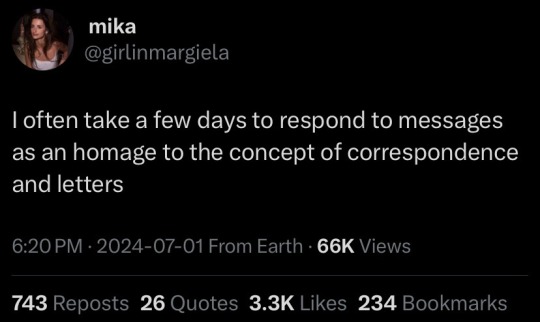Where there are stories- or at least plot bunnies and (sometimes) fanart
Don't wanna be here? Send us removal request.
Text
we only get snippets of what iroh was like “back when he was a different man.” we know that he joked about burning ba sing se to the ground in a goodnatured manner; that azula referred to him as “his royal tea-loving kookiness” before his change of heart; that he learned from the dragons and respected the sun warriors, but lied about it to protect them as well as his own image. we know that he was azulon’s uncontested favorite, that ozai resented him for it, that he was once a mighty general, but still a charming tea-enthusiast who kept a level head.
before the death of his son, he viewed war as a game to be won—like pai sho—rather than recognizing the brutal reality, the senseless violence and devastation war truly is. he had a reputation—as a mighty general, a fearsome firebender, the dragon of the west, next in line for the throne, a charming, affable, tea-loving ladies’ man.
we don’t see lu ten, but we can vaguely infer snippets of what he was like from the way iroh attempts to raise zuko as his surrogate son. he is endlessly supportive and yet he still makes assumptions about what zuko would want and would like, and perhaps this is based on both his own proclivities as well as those of his first son. lu ten was a soldier. he was the heroic older cousin of zuko and azula. he was raised by a loving father as a doted-on only child, destined to someday take the throne in a peaceful exchange of power and continue to promote the fire nation’s conquest, their greatness.
iroh, and by extension, lu ten, do not wholly align with the typical image of the fire nation disposition that we are shown as embodied by ozai. yes, iroh conforms perfectly to standards of fire nation masculinity. he is a powerful firebender. he is a confident chauvinist. but despite his imperialist outlook, he does not view his family as mere pawns in his game. he is so self-assured in his position that he could never be so insecure as to not love his family. he cares about his son, his nephew and niece (despite not actually being around enough to truly understand them), his father. azulon might be a powerful, intimidating figure, but he clearly cares for iroh, and iroh cheerfully conforms to his standards and expectations without breaking a sweat.
what must it have been like for the great dragon of the west to knock down your gates and raze your village to the ground with a calm yet mischievous twinkle in his eye, pouring himself a cup of ginseng tea while he oversees the abject destruction of your life, your family, your people? he laughs merrily as he summons lightning effortlessly. he is just doing his job. this is fun for him, just another game at which he excels.
ozai is heartless, power-hungry, and deeply insecure. he has something to prove, and he cares about nobody but himself. he is exceedingly easy to hate. but what about general iroh, the dragon of the west, who is completely confident in his position, who genuinely loves his family, who cultivates hobbies, who charms, who takes an interest in the arts, who approaches every conquest with a carefree cheer that chills you to the bone? what then?
8K notes
·
View notes
Text
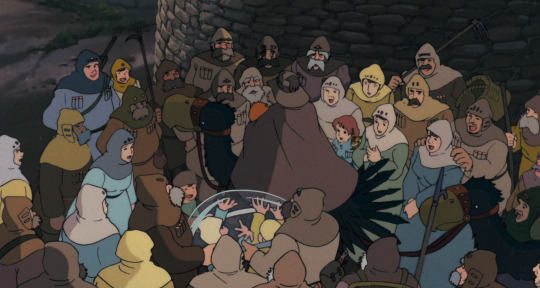
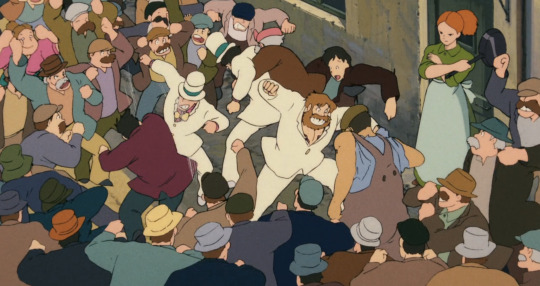


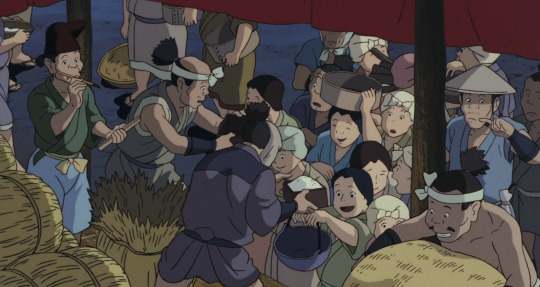
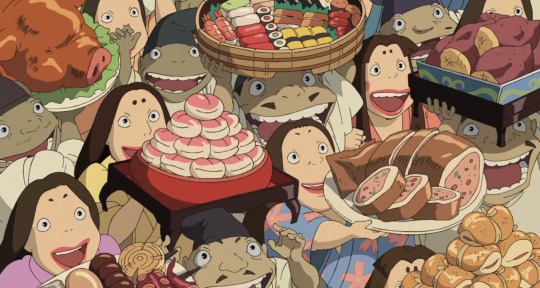
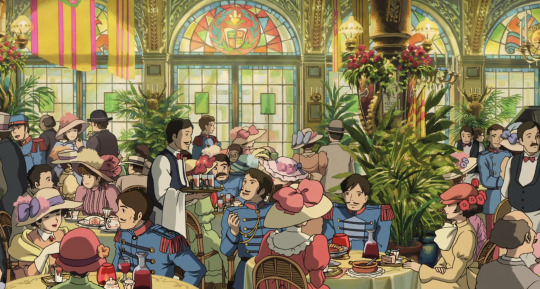
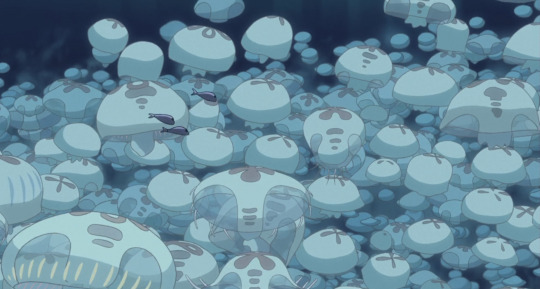
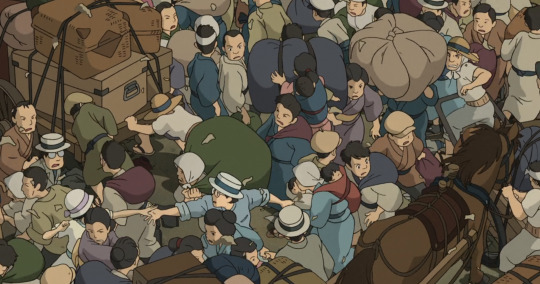
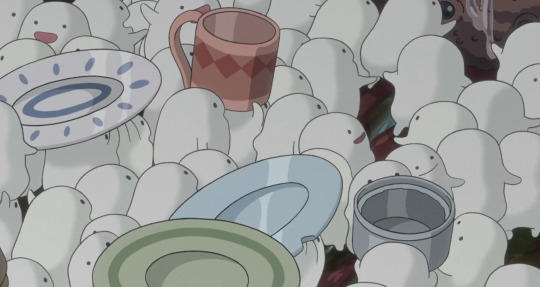
Miyazaki’s visual storytelling thrives on a sense of flatness that doesn’t diminish but rather enriches his worlds. By compressing the layers of his compositions—merging the foreground’s details, middle ground’s action, and background’s context—he crafts images that feel like living illustrations. Take the Warawara swarming with dishes in "The Boy and the Heron" or the jubilant feast scene in "Spirited Away" : both are packed with vibrant details, yet the visual plane feels collapsed, like a tableau unfolding all at once. This "flatness" isn't a flaw but a deliberate technique, pulling us into the frame as if we’re unrolling a scroll of visual wonder. It’s not depth that Miyazaki aims for—it’s a sheer density of storytelling in every frame, a reminder that 2D animation’s strength lies in its ability to immerse without imitating.
18K notes
·
View notes
Text
hyperfixation please stay with me long enough to complete the project. hyperfixation do not fade. hyperfixation finish what you started for the love of god
143K notes
·
View notes
Text

You can tell he’s having a great time at this meeting
3K notes
·
View notes
Text
Hey everyone, I know it's going to be a busy day for a lot of people, but Google enrolled everyone over 18 into their AI program automatically.
If you have a google account, first go to gemini.google.com/extensions and turn everything off.
Then you need to go to myactivity.google.com/product/gemini and turn off all Gemini activity tracking. You do have to do them in that order to make sure it works.
Honestly, I'm not sure how long this will last, but this should keep Gemini off your projects for a bit.
I saw this over on bluesky and figured it would be good to spread on here. It only takes a few minutes to do.
149K notes
·
View notes
Text
I just watched Avatar for the first time all the way through, and yeah, it’s great, but the one thing that surprised me was how different Katara was compared to the fandom interpretation I’d seen and internalized before watching.
Like, before you watch Avatar, you’ve seen all these memes about Katara and her mom, and based on those memes, you assume it’s one of those lines you have to get used to hearing at least once every episode. But then you watch the show and realize that she only talks about her mom maybe five or six times per season and you also realize she only brings her up when she’s trying to comfort someone or empathize with them because that’s how she processes her grief and that’s one way she connects with people.
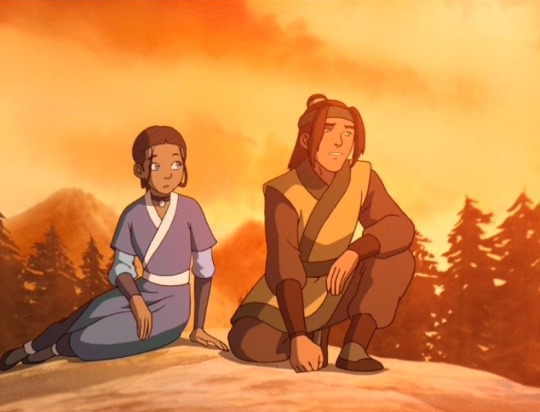
Or you hear the infamous line, “then you didn’t love [our mother] the way I did” and you prepare yourself for one of the worst character assassinations ever only to see the scene after nearly three seasons worth of context and realize she was kinda right. She’s been the mother, the nurturer, the comforter. She’s been patient, gentle, and accommodating where everyone else has gotten to be insensible and reckless and childish, and the one moment where she allows herself to feel her grief, suddenly she’s this evil bitch and not, y’know, a 14 year old girl whose been thrusted into adulthood in a way no other character has. A 14 year old girl who should be allowed immaturity and raw emotion and anger instead of the patience and grace she’s been forced to extend to every character without even the smallest amount of gratitude or even consideration in return.
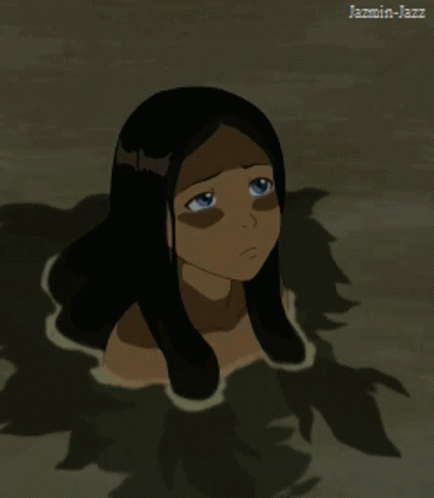
Or you see all of the clips where Katara puts Aang in the “friendzone” and you expect to have this wishy washy back and forth where Aang is putting his feelings out there only to have Katara neither commit nor express any clear reciprocation or rejection. Then you watch and realize that, as cute as the ship is initially, that there’s never a point where Aang returns any comfort or grace to Katara despite her always doing this for him to the point of coddling. That for as much as Aang says he loves her, he never seems to outgrow his perception of her so he can recognize her as someone who feels grief, anger, and pain as much as she expresses love, kindness, and maturity. And instead of having moments where he learns to see her beyond her strength or compassion, you’re instead given moments where Aang forces his feelings onto her, both romantic and non-romantic, and Katara is expected to just…shoulder those feelings the way she shoulders everyone else’s.
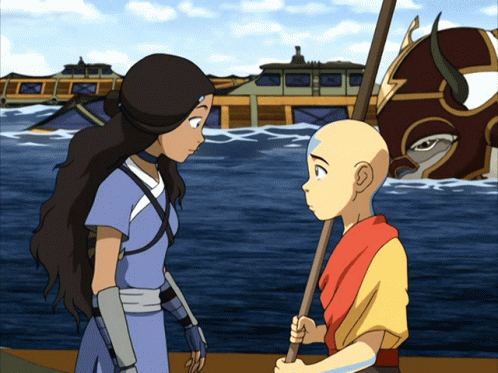
Katara is the most misunderstood character in the show. As much as people recognize the complexities of Zuko, Sokka, and Azula, they struggle to do the same for Katara because they see her struggles as somehow lesser, and therefore, less deserving of sympathy. They can handle her so long as she’s being endlessly patient and loving and kind, but the moment her endless love, patience, and kindness runs out, she’s suddenly this annoying bitch who can’t shut up about her mother or reciprocate Aang’s feelings. But Katara’s trauma does matter as much as anyone else’s. No, she wasn’t banished from her kingdom. No, she didn’t lose her entire community, and no, she isn’t the only one who lost her mother. But the difference between her and everyone else whose experienced loss because of the Fire Nation is that she’s never given time to process her trauma. Aang gets to lean on Katara constantly. Toph gets to express her feelings to Katara, and yeah, Sokka also lost their mother, but unlike Katara, he isn’t put in the position of being a substitute for everyone’s parent. He even admits that he sees his sister as a mother. The only characters who ever comfort Katara or allow her to vent is Zuko and her father and that’s, like, three scenes in a show where the other characters are consistently given opportunities to seek out Katara for unconditional support.
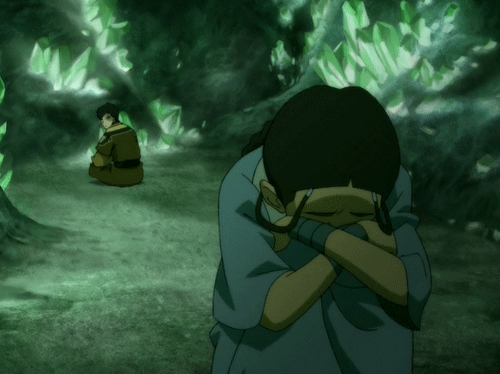
The fandom interpretation of Katara has been so bastardized that even those who haven’t watched the show know her for this fanon version and not for who she is. She’s such an interesting character beyond her fandom limitations, though. She’s brave, hot-headed, and hopeful as well as gentle and caring. She wishes to learn waterbending, not only because she wants to fight in the war, but because she wants to continue her culture’s practices because, and people often forget this, she also lost an entire subculture within her already fractured tribe. And she wants to defeat the Fire Nation both because of her deep love and empathy for other people, but also because she wants to avenge her mother. But because some of the fans have reduced Katara to a bitch who constantly whines about her mother and friendzones Aang, you wouldn’t know any of this, and it sucks because she’s the only character whose been dumbed down to such an extent.
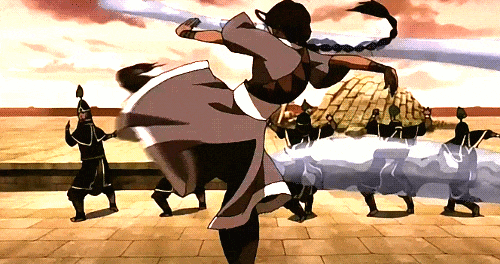
26K notes
·
View notes
Text
My sincerest apologies and warmest welcome to my rant about FF7: Crisis Core. Or, as I like to call it,
Propaganda: The Video Game
I say this with the utmost affection. Crisis Core ranks really high up there in my favorite Final Fantasy 7 installments. I played it when it first came out, borrowing it from a friend to play on a borrowed PSP. And, the more I learn about the game and the more I replay it, the more everything lines up.
This game is not about Zack Fair.
This game is about how Capitalistic Propaganda can sink into every aspect of life to the point where it is entirely indistinguishable from reality. And it’s very overt about it. So…
Here we go.
My treatise on Propaganda’s starring role in Crisis Core.
Part One: The Timeline
Something that a lot of people gloss over due to decades of Child Heroes in media—Japanese Shonen and Shoujo series in particular—is how young these protagonists are. We’ll hand-wave a lot of stuff in non-live-action series with just a little bit of suspension of disbelief. And that’s honestly just accepted these days. But here’s the thing about those hand-waves.
Final Fantasy 7 doesn’t do that.
Now, FF7 hand-waves a lot of stuff. For example, how far you can travel in a day by foot, the distance a man weighing approximately 165lbs can jump after being genetically fused with what might as well be a cocaine demon (Jenova), and how much hairspray one can reasonably carry on a cross-country journey while on the run from the feds.
Age is not one of them.
Exhibit A: Yuffie Kisaragi.
Do I really need to say more? She acts her age. So does Zack. And Aerith, even. Most of the characters in the original lineup were over twenty for a good reason. We see several kids in the series, and they all act their age, too—both the OG and the remake. Age is not a thing that FF7 really grapples with. It’s something they take relatively seriously.
Now, to the point.
Zack is 16 when Crisis Core starts…
… and he was 13 when he ran away from home without his parents’ knowledge to join the military.
Which accepted him.
At 13.
Without a parental permission slip.
Think about that for a second.
… Or for the next several parts of this breakdown.
Part Two: The Main Character
As I mentioned in the introduction, Zack is not the main character of the events of Crisis Core. Instead, he is the focal point of the second person POV. This is not the first time Square has done this. It was done most notably with FF9, FF10, and FF12. (I’m not going to go on an Akira Kurosawa rant right now, but please check out his film “The Hidden Fortress”. FF12 and Star Wars episodes 4-6 borrow heavily from this film.) The purpose and position of this character is such that they might best witness the effects the other characters make on the world as their stories unfold, usually in the role of a love interest. For Akira Kurosawa, it may have been told this way because these people are most effected by the decisions being made.
“Well, then, Sal,” you may be asking, “who would you say is the main character? Would that be Aerith, since she’s the love interest, like in the other games?”
No, actually.
It’s the antagonist.
And by that, I mean Genesis.
Hear me out. I used to hate Genesis, for I was once young, full of judgement for flamboyancy (thanks, internalized homophobia), and was led by the narrative to believe he was mean to his friends. Then I met my Lovely beta who loved him, so I wrote a fic for her as a gift. So for that I kinda just… read stuff. Because that’s the thing about Propaganda—you gotta read stuff to navigate it. I read the in-game emails. I re-watched all the scenes I could get my hands on with him. I read his wiki and tried to track down more information about him. Then I watched the scenes in Japanese and gained a better understanding of not just Genesis, but Sephiroth’s character. And I realized that Genesis was put on this road from the start. In fact, a big part of the fact that he’s seen the way he is in Canon—only at his most hostile and lowest points—is because the story is told through Zack’s point of view.
So before we get into the breakdown, here’s the hard facts about Genesis.
1. He was a test tube baby who may or may not technically be Angeal’s fraternal twin brother, which we are not going to unpack right now.
2. He was adopted by a relatively rich family.
3. He was a child genius (which requires not only resources, but drive to achieve), and at a tender young age of like… ten or something? He decided to mess around and literally invented pasteurization. Which is incredible, and really speaks to his knowledge of the world and ability to grasp complex concepts even at a young age. But, again, this is not the time or place to unpack that.
4. He was best friends with Angeal, who might as well have been the sweetest, kindest boy to ever walk the Planet. (I’m biased. I love him.)
5. As a teenager, he became fixated on Sephiroth, who had gained national acclaim as a SOLDIER despite them being the same age. (Please see part 1 and think about that for a second.) He then goes to join SOLDIER and brings Angeal with him. And Angeal brings his step-father’s puritanical “hard work is honorable” mindset with him. (On that note, Angeal and his father’s arc really are a wonderfully scathing letter to companies that overwork their employees and how toxic/unhealthy that line of thinking is. But. Again. We are not unpacking that right now.)
6. At one point he became consumed with LOVELESS, a series of poems with heavy prose and symbolism thicker than syrup. It got to the point where he was so well known for it that there was an entire fanclub dedicated to both him and analyzing the text.
7. While he was in SOLDIER, he repeatedly had his achievements publicly accredited… to Sephiroth.
Over and over and over again.
Everyone did, really. They mention it in the beginning of the game. Sephiroth even got public credit for Zack’s raid on the castle when he wasn’t even there. How much of his legacy is real? How much of it is made up? How much of it was faked? We don’t know. No one knows. But he keeps getting credit, anyways. And when Genesis confronts him about it, Sephiroth doesn’t care. In the Japanese version of their fight scene, you could even say he indirectly implies that he wants Genesis to take his place as the “hero”. In the English, Sephiroth’s line is, “Come and try.” But in the Japanese the line is closer to, “Wouldn’t that be nice?” Which, depending on how you take his tone, can mean wildly different things—from mocking, to earnest, or even admiration—which is especially to tell because he might be annoyed with Genesis at the moment.
Fun Fact: In Ever Crisis, Sephiroth explicitly says they are making up his achievements in the press to target boys his age for recruitment. (Thus why they accepted Zack at age 13.)
My theory on this line is that he is being cynical; that Genesis doesn't understand just how harrowing and even humiliating his experience has been. This only enforces my theory that the "come and try" translation in the English not only does a disservice to a line as wonderfully heavy as, "Wouldn't that be nice?", but fundamentally misunderstands Sephiroth as a character.
8. Genesis then took the fight to Shin-Ra. Inspiring a good chunk of their staff to leave the company, he then staged multiple attacks on facilities, staff, and the main building—which also spilled out into the city of Midgar. He murdered his parents, buried them, killed everyone in town, and… Yeah. It wasn’t pretty. A lot of innocent people died simply because they were vaguely associated with Shin-Ra. These are the actions of a villain. What’s more, this is clearly a sign that he has been acclimatized to death and violence by Shin-Ra to the point where he doesn’t even consider taking hostages.
Except.
Except the entire town was a Shin-Ra town.
Banora, canonically, was a Shin-Ra built town, which means everyone there was basically an employee of the company. No one was safe. Everyone was a threat. And that…
That was how he was raised. And he finally knew the truth—that every moment of his life was touched, controlled by Shin-Ra, all the way down to his very conception. He has never known freedom. He has never known his own identity. And now that very cage was killing him, slowly and painfully, and turning him into something that couldn’t even be recognized as human. He was watching himself rot in the mirror, and it was all because of Shin-Ra’s greed. And as he searched for salvation, he sunk into LOVELESS as he always had, hinging his entire life on Minerva’s Gift because he knew he was dying and that was all he had.
9. And then he died…
10. … but then it turned out LOVELESS was actually kind of a blueprint, and he did meet the Goddess, and he did get reborn without his degradation so he was rewarded for his journey in the end.
So why wasn’t Genesis the main character of the game?
Simple.
His actions challenge the status quo without being about the status quo. It’s a story about revenge. It’s a story about retribution. It’s a story about answering mass violence with mass violence and ultimately being rewarded by it. And while, yes, the series is an action-based violence simulator, the violence in the original FF7 was a guided, tactical effort. (For all that the characters aren’t the brightest bulbs in the sun lamps.) But the biggest, most obvious shift in the narrative happened when they realized their role as terrorists—bringing mass violence to the company via bombing and open aggression—was just resulting in increasing levels of retaliation against uninvolved people. They might as well have been a child beating the ankles of a giant. The goals and themes of the game fundamentally change when they realize that answering mass-scale societal violence with mass-scale physical violence was not only unsustainable, but also wasn’t going to solve their problem.
FF7 is about change and learning when violence—and what kind of violence—is appropriate in the face of different threats.
Genesis’ arc undermines all of that, and making him the main character would contradict the very heart of the OG game.
So, instead, we are positioned as Zack, connected to him through a mutual friend. From there we see all the damage and horror this vengeance brings to those living under the status quo.
But also, that plotline’s a major downer in a lot of ways, so they needed to lighten things up a bit to keep audience involved. And that’s why Zack is, well…
Part Three: Zack is a Himbo
Please, for the love of all that is holy, keep in mind that everything I say here is with the utmost affection.
Zack is dumb as a rock.
He is a charismatic, enthusiastic sixteen year old jock who ran away from home at thirteen years old to join the military. Which, please know, why I say “military” I mean “private security guard force with a standard-issue Death Baton and a license to kill”. The first scene in the game is him being excited that he gets to murder a bunch of people in a simulation, which he is immediately scolded for by his mentor. He is a glorified, souped up private security guard who is canonically only in it for the glory at first. He wants to be a “hero”, but doesn’t seem to fundamentally know what that means. And, over the course of the story, the definition of that clearly changes for him.
Which tracks, because the story takes place over a period of time with high stress.
Occasionally I see people saying they wish that Zack had more complexity to him, and honestly? The game. Would be. SO. BAD.
Full Disclosure: I am not the biggest fan of Zack specifically because he lacks a lot of nuance. I wish he was a bit more complex, too. But I also know that would break the game. What’s worse, if he was still on Shin-Ra’s side because he understood Shin-Ra’s mission… Well… That would make him a villain, or a cog at best. That’s not main character material. It would make the ending more messed up, though.
Anywho, Zack was thirteen when he left home. He had no formal education. He didn’t tell anyone what he was doing. He even joined without a permission slip from his parents. This means that Shin-Ra was accepting thirteen, possibly fourteen year olds into the military. (Some people will say this tracks because you can get a job at fourteen in many parts of Japan. But, and this is important, you aren’t allowed to be a security guard until you’re quite a bit older, and you need a specific license for it, much like in the US.) Clearly they didn’t teach this boy critical thinking skills. Not because he’s a himbo, but because having their Super-Powered Private Security Force With A License To Kill think independently would explicitly go against their interests. (EX: Genesis.)
Shin-Ra needs SOLDIERs to follow orders or the company would no longer be able to function. Seconds and Thirds aren’t even allowed to reject missions. (One could argue that sending certain someone on back-to-back missions would be a good way for them to eliminate undesirables within the ranks by sending them to their deaths, which… would make an incredible fic idea, actually.) We already know that First, Second, and Third Class rank assignments do not actually reflect the power of the SOLDIER. This is canon. I would instead argue that those who make the rank of First Class aren’t necessarily the most powerful, but are instead the most visible in the media, thus the easiest to market, and/or the easiest to manipulate and control. (For a great example of this, see The Umbrella Academy.)
The point is, Zack may have been elevated to his position as a first specifically because he is malleable and single-minded. Even after all he saw with Genesis, he stuck by the company to the very end, with the exception of the time Sephiroth was literally guiding him to fail a mission. Zack allowed himself to take Shin-Ra’s side every time, taking down their enemies and following their orders, preserving his “honor as SOLDIER” as he had been taught. The only thing that made him stop…
… was literally getting put in a jar.
It was when he was no longer a SOLDIER.
Part Four: Honor
There is no such thing as SOLDIER Honor.
I repeat: There is no such thing as SOLDIER Honor.
It is a fictional thing that is borne of an ideology based around hard work. It only has power because it is believed in. It is an intangible social construct similar to the law, mathematical order of operations, and gender roles. So why are Angeal and Zack obsessed with it?
Pretty simple.
Angeal’s step-father followed it.
Now, we know three things about Angeal’s step-father.
1. He was chill with the fact that Gillian was already pregnant when they started dating.
2. He was a very good father.
3. He worked himself to death trying to pay off the sword he bought Angeal.
This, of course, says a lot about Angeal considering he rarely uses the sword. He essentially sees that sword as the symbol of his step-father’s life. Everything he uses it for, he sees as more important than his step-father’s life. That thing is usually Zack.
Zack, who is the child who joined the military based on stories of heroes.
Zack, who rises against Angeal in the name of his own step-father’s ideology and tries to talk him down, even at the very end. But Zack fails because he fundamentally doesn’t understand what’s going on, partially because “Soldier Honor” is just one more aspect of this narrative he was given. It is a narrative that Angeal has had to step away from, even though he doesn’t want to leave the memory of his step-father behind. He was a good man. He was a good, hardworking man.
And that is why he died.
Corporations will use you up until there is nothing left, then honor your memory/sacrifice. Shin-Ra was doing the exact same thing the company his step-father worked for did; using up SOLDIERs until they outlived their usefulness. And Angeal was horrified to realize that his “SOLDIER Honor” wasn’t honor at all.
It was willingly submitting to control.
But, unlike Angeal, over time, this meaning changed for Zack. Partially because he didn't understand it fully in the first place. It became about acting with integrity. It became about helping people. It became about not lying down and watching the abuse Shin-Ra handed out in exchange for literal money; for maintaining the status quo.
At the very end, Zack understood what it meant to be a hero.
Part Five: The Conclusion
To sum up, Zack believed in and idolized the propaganda spread by Shin-Ra at such a young age, and was so convinced by it, that he ran away from home at thirteen to join the military.
He was their target demographic, so they happily took him into their ranks. What’s more, people think this is normal enough that we see no one opposing this, because the only people who oppose Shin-Ra are “extremists” or “violent terrorists”.
Zack then became their loyal puppy, groomed to fill his role as super-powered attack dog to sick on anyone they deemed appropriate, and he filled the role. He believed he was doing good. He didn’t think they were invading another country, because that’s not what he was told.
He went after Genesis, because that’s what he was told, and he wouldn’t let Genesis’ actions shake his faith in the company.
Then he went after Angeal, hoping to get answers, only to become more confused. Angeal taught him about SOLDIER honor. He taught him about a higher calling. He was the one who made Zack truly loyal to the company. This challenged everything Zack knew.
He went with Sephiroth, planning a small rebellion of their own (a white lie on paperwork) to get answers, only to find things he wasn’t ready for and couldn’t fully understand.
Zack is shaken by each of these events. Horribly. At times, we even watch him grieve. But time and time again, he doesn’t leave the company. He sees the damage they do first hand, and he doesn’t leave the company. The company isn’t the problem, to him. He reads their emails, does their dirty work, and “maintains his SOLDIER honor”.
Zack swallows what they give him right up until what they give him is torture.
Zack swallows what they give him until he becomes their victim.
Every step of the way, Zack is fed a story of how the world is. He was raised on it. He lived it. He became part of it. He was paid peanuts to enforce the status quo Shin-Ra installed in the world by force, and he was proud of it because it was, to him, something to be proud of.
Zack believes the propaganda whole-sale, and we get to watch, from the point of view of an outsider, as it slowly destroys his life before killing him.
Propaganda has the power to make suffering normal. Propaganda has the power to make murder righteous. Propaganda has the power to take a thirteen year old boy out of his home so they can give him a sword, and when they point him in the direction of their enemies he charges of his own volition, because they made him believe in their cause. And he believes in their cause because he believes that it makes life better for everyone.
But that’s not what’s actually happening.
That’s just what he was told.
Crisis Core is about propaganda, and the depths to which it can affect our lives. It changes our belief systems. It changes our perceptions of reality. And when it’s torn down around our eyes, it can make us go insane. It can make us violent and unreasonable as we realize just how much violence is being forced upon us—violence other people just plain do not see. It's just a a piece of paper. It's just a law. It's just a job.
It's just a war.
Final Fantasy 7 was about Fascism.
Crisis Core is about the propaganda that built it. It is told from the point of view of a boy, then a man, steeped in it. He watches until the people suffering around him—Sephiroth, Genesis, and Angeal—are twisted into villains by the truths and lies around them. Genesis and Angeal are tortured by truths, Sephiroth is transformed by lies, and Zack is subsequently hunted down to conceal them.
Crisis Core is Propaganda: The Video Game.
358 notes
·
View notes
Text
Ifalna, sensing her daughter entering the afterlife: Aerith! What ha-
Aerith: the Planet is haunted.
Ifalna: what
Aerith, somehow cocking Holy like it's a Desert Eagle: Planet's haunted.
81 notes
·
View notes
Text
This will hugely vary from bow to bow (and historical bows have more drop than modern ones) but your +14 Bow of Slicing Through 3 Enemies With One Arrow is probably going to fairly comfortably shoot past 50m!
Also, I really love the shot at 30m where my arrow left a silhouette of droplets! It was very fun 😁
More content on Patreon but for some reason Tumblr won’t let me link it today 🤷
8K notes
·
View notes
Text
Yes it’s very important for solidarity with workers but, and maybe this is an unpopular opinion, workers should have solidarity with poor customers. Like ignore shoplifting, be sensitive when ppl are using EBT cards, that kinda thing.
122K notes
·
View notes
Text

Sokka sketchpage, now in colour!
★ patreon || website || bluesky ★
5K notes
·
View notes
Text
Chapter two edited and posted now! This one has more changes to it than the first did, because I decided I didn't like how Starrk came across in the first one, and I think it feels a lot better now.
8 notes
·
View notes
Text
A Dark Night at the University, Chapter 4: Zuko Gets Escorted From the Library
In which Zuko raises his voice to the wrong librarian.
Latest chapter || Read from the Beginning || Series Start
Story Summary:
A missing professor. Stolen research notes. And a junior guardsman, on his first case. Uncle is so proud. AKA: accidentalGuard!Zuko AU. A Ba Sing Se crime noir where, instead of totally ignoring that Zuko stole a guard's swords to fight Jet, the guards gang press him into joining their Juvenile Delinquent Community Outreach Program. They're going to regret it. Zuko already does.
141 notes
·
View notes
Text
Shout-out to multilingual writers who are writing in their second (or third and so on) language.
The frustration of speaking it fluently, but still having to google basic words when you're writing.
The absolute joy of finding a word that sounds just perfect and conveys exactly what you mean.
Doubting all your grammar and being afraid to post it or even send it to a beta reader.
The euphoria of someone calling your use of this language, that is not your mother tongue, beautiful.
12K notes
·
View notes
Text
The Batfam is incredibly dysfunctional, but they’re also incredibly intelligent. Therefore, when I write them arguing without resolution, I have to repeatedly fall back on the same few fundamental communication barriers:
Someone (usually Dick) is correct, but contradicts or undermines themself every other sentence—either out loud or in their head.
Jason is correct, but says everything in the rudest, most condescending way possible, so no one listens to him.
Tim attempts to make logical arguments in an emotional conversation or emotional arguments in a logical conversation.
Someone’s (usually Tim’s or Damian’s) logic is too confusing to follow outside their brain, and therefore is either unable to convince anyone (if correct) or unable to be refuted (if incorrect).
One or more of the people involved (often Jason, Tim, or Steph) is far more interested in taking potshots at another person or people and routinely interrupts any productive conversation.
A character is absolutely correct but thinks they have no right to be involved in the argument. (Dick, Tim, Steph, or Duke, mostly—the others insert themselves into pretty much everything.)
The premise of the argument is so bizarre or disturbing that one or more characters refuse to participate or are at a loss for words. (Happens to all of them, really.)
A character (usually Bruce) is correct, but says everything in the worst way possible. It is taken poorly.
Of course, then there’s the classic “missing information,” “outdated information,” and “assumptions mistaken as information” trio.
…please add to this, I need more ways to make them argue dysfunctionally/interpersonal conflict fuel.
1K notes
·
View notes

